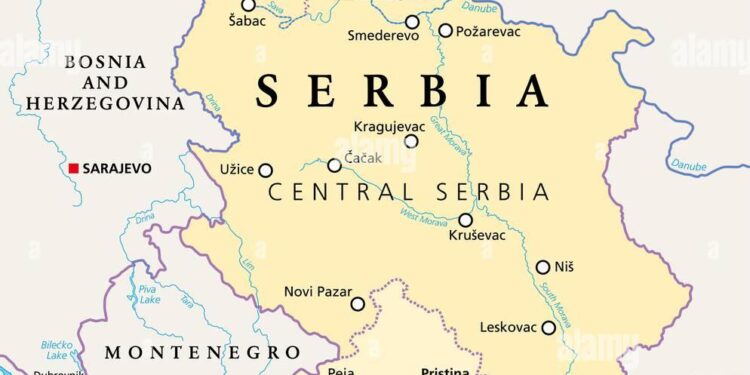Serbia has unveiled a groundbreaking initiative aimed at enhancing early warning systems and boosting disaster resilience across the Western Balkans, the United Nations Office for Disaster Risk Reduction (UNDRR) reported on Tuesday. The new program seeks to improve regional coordination, upgrade technological infrastructure, and foster community preparedness in the face of increasingly frequent natural hazards. This strategic move comes as the Western Balkans confront mounting challenges posed by climate change and extreme weather events, underscoring the urgency of strengthened disaster risk management in the region.
Serbia Advances Regional Cooperation to Enhance Early Warning Capabilities
In a significant step towards bolstering disaster resilience across the Western Balkans, Serbia has embarked on a pioneering initiative focused on enhancing early warning systems. This collaborative effort aims to integrate advanced technologies and streamline communication channels among neighboring countries, ensuring timely and accurate information dissemination. The initiative prioritizes capacity-building and knowledge exchange, drawing on expertise from both regional and international stakeholders to create a more cohesive and responsive network for natural hazards.
Key components of the strategy include:
- Deployment of state-of-the-art monitoring equipment along vulnerable zones
- Implementation of cross-border data sharing protocols
- Joint training exercises for emergency responders
- Community outreach programs focused on disaster preparedness
| Country | Early Warning Coverage (%) | Expected Improvement (next 2 years) |
|---|---|---|
| Serbia | 65% | +20% |
| North Macedonia | 58% | +25% |
| Montenegro | 60% | +22% |
| Bosnia & Herzegovina | 55% | +18% |
UNDRR Emphasizes Integrating Technology and Community Engagement in Disaster Preparedness
In a significant move to fortify disaster preparedness across the Western Balkans, UNDRR highlights the critical role of merging advanced technology with active community involvement. This approach aims to build more resilient societies by enhancing early warning capacities that are both scientifically sound and locally relevant. By leveraging innovations such as AI-driven forecasting tools and mobile alert systems, coupled with grassroots participation, the initiative ensures real-time risk communication is accessible and actionable for vulnerable populations.
Key components emphasized by UNDRR include:
- Deployment of smart sensors and IoT devices to monitor environmental hazards continuously
- Community training programs designed to enhance local disaster response skills
- Collaborative platforms encouraging data sharing between governments, NGOs, and citizens
To illustrate the layered strategy, the table below summarises the pillars of the initiative:
| Component | Purpose | Target Group |
|---|---|---|
| Technology Integration | Automated hazard detection and alert dissemination | Emergency services & local authorities |
| Community Engagement | Empowerment through education and participation | Residents in high-risk areas |
| Data Collaboration | Real-time information sharing to inform decisions | Multi-sector stakeholders |
Experts Recommend Strengthening Cross-Border Communication and Resource Sharing for Greater Resilience
Regional experts emphasize that enhancing resilience against natural disasters in the Western Balkans requires a concerted effort to improve cross-border communication channels. Strengthening dialogue between neighboring nations enables faster dissemination of early warnings, ensuring critical information reaches affected communities promptly. This approach fosters a unified response, mitigating the risks posed by floods, earthquakes, and other hazards. A proactive information-sharing framework will bridge existing gaps, enabling authorities to coordinate more effectively and mobilize resources without delay.
Key strategies proposed include:
- Establishing interoperable communication platforms between national agencies
- Creating joint training programs for emergency responders across countries
- Pooling human and technical resources for real-time disaster monitoring
- Developing shared contingency plans and data exchange protocols
| Country | Communication Initiatives | Resource Sharing Focus |
|---|---|---|
| Serbia | Cross-border alert systems | Seismic monitoring tech |
| Montenegro | Joint risk assessment workshops | Mobile response teams |
| Bosnia & Herzegovina | Data exchange platforms | Flood control equipment |
To Conclude
As Serbia spearheads this vital initiative to enhance early warning systems and bolster disaster resilience across the Western Balkans, the region takes a significant step toward safeguarding its communities against future crises. Supported by the UN Office for Disaster Risk Reduction (UNDRR), the collaborative effort underscores the importance of regional cooperation in addressing shared vulnerabilities. With improved preparedness and timely responses, Serbia and its neighbors aim to reduce the devastating impact of natural disasters, fostering a safer and more resilient future for all.
















